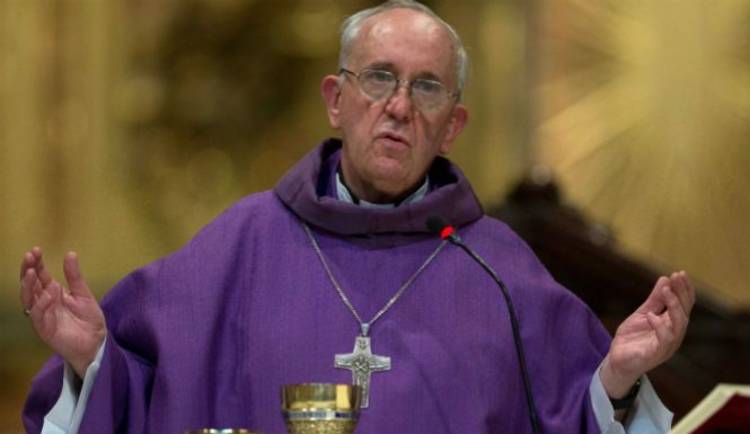


VATICAN CITY - At 7:10 pm on Wednesday as rain continued to pour down, the shell-shaped square facing St. Peter's Basilica was again jammed with the faithful huddled under umbrellas in the darkness to await the day's second and final smoke signal.
We expected black smoke, marking the conclusion of the second day of the Conclave and the conclusion of five ballots - one yesterday afternoon, the other four today. Instead the smoke was white. The crowd literally surged forward with excitement, sweeping me along to 30 or so yards from the Basilica. As bells rang joyfully, Italian and American flags were waved, and cell phone photo flashes looked like fireflies. A group of Italians began singing the national anthem, Fratelli d'Italia.
One hour later came the announcement: the new pontiff is the archbishop of Buenos Aires, Jorge Mario Bergoglio, 76, the son of Italian immigrants to Argentina. He is considered a traditionalist in theology but a modest, honest man who has been cooking his own meals as cardinal, and has taken the bus to work, at least until now. He is the first Jesuit pope in history and has elected a name which evokes St. Francis of Assisi, Francis I. He studied in Germany, and is considered on the reform side of the church on social justice, if not on such other contemporary issues such as gay marriage and abortion. "An imaginative, inspired choice," many veteran commentators like Robert Mickens of the British Catholic magazine The Tablet were saying. One reason is that he is expected to address the issue of governance, which in clerical-speak today for addressing the problems of the scandal-ridden Vatican bank, the IOR, and of child abuse.
Waving to a crowd estimated at 150,000, he appeared shy but also engaging and warm - a pastor rather than a professor. His modest life style reflects the fact that he is a man who has lived in the Church of poverty rather than in the relatively more wealthy Europe. To have a South American pope is important to the Church, for this is one of the regions in the world where the Church is growing rapidly despite challenges from evangelical Protestants. He has diplomatic experience and is also known as a supporter of the Communion and Liberation movement.
Prior to this, like the nasty March wind, gossip had whipped around Rome. No one could legitimately claim to be in the know, but this did not put an end to it. Reports from deep within the Conclave spoke of a tense atmosphere - but then, how was the reporter to know this? Today's scuttlebutt was that the (supposedly) front-running Italian candidate, Cardinal Angelo Scola of Milan, was suddenly being opposed on grounds that he has allegedly been too closely involved with a regional political leader, who is deeply enmeshed in scandal. This presumably paved the way for an alternative from the New World: Brazil, Argentina, Canada and, last and probably least likely, the U.S.
I happen to have been on hand in Rome for the elections of four pontiffs, but this election is different. As the veteran Italian Vaticanist Massimo Franco has pointed out, at this point no one believes that Pope Benedict XVI resigned solely on grounds of ill health. True, his left eye is giving him severe trouble, and persistent rumors circulate that he has Parkinson's, but it is also known that, as a gifted theologian and spiritual man, Benedict did not enjoy trying to rein those running the Curia, as the Church government is known.
"Governance" is the key word here, referring to everything from transparency in banking (read: eliminate the possibility for money laundering) to openness with the media and the congregations (read: no cover-ups for abuse). The Curia is considered conservative and inbred; the outsiders, and especially the non-Italian cardinals, are considered to have a larger number of reformers. These are relatively new problems, though some were certainly swept under the carpet during the past two papacies.
In another way this Conclave has differed. When a pontiff falls ill, the machinery begins to work, including the initial contacts for a possible successor; Cardinal Ratzinger was considered by insiders a shoo-in. But at least the timing of his resignation as pope came so unexpectedly that it threw a wrench into the works, as does the former pope's continuing to live within Vatican walls. This is all unexplored territory for the Church, and also an opportunity for renewal.
In St. Peter's Square this evening, I found, besides the tourists, priests, nuns and Romans, over 6,000 accredited press (mostly TV). Most are already tired from working from 8 am till midnight daily, and a veteran American reporter said, obviously in irony, "If they elect an American, I quit. I'm already too tired."
Source URL: http://test.iitaly.org/magazine/focus/op-eds/article/white-smoke
Links
[1] http://test.iitaly.org/files/bergoglio1363211078jpg